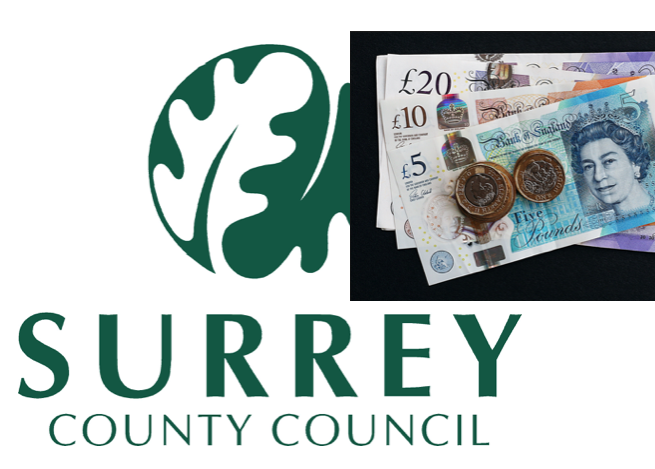Last year, the Local Government Chronicle could only identify three councils that were imposing no increase and five councils planning rises below the referendum limit or putting extra support in place for residents to mitigate against the rise.
 Abraham Lincoln
If given the truth, the people can be depended upon to meet any national crisis...
Abraham Lincoln
If given the truth, the people can be depended upon to meet any national crisis...
 Guildford news...
for Guildford people, brought to you by Guildford reporters - Guildford's own news service
Guildford news...
for Guildford people, brought to you by Guildford reporters - Guildford's own news service
As Usual, Council Tax to Be Hiked As Much As Allowed Without a Referendum
Published on: 29 Jan, 2025
Updated on: 29 Jan, 2025
local democracy reporter
A council tax hike is likely to be hitting Surrey residents in April.
SCC members are taking their first look at the county’s budget which, if agreed, would mean a maximum increase of 4.99 per cent on council tax, a rise of £1.69 a week for a Band D household.
The proposed increase was agreed by the cabinet on January 28 and will be voted on at Surrey Council’s budget meeting next week on February 4.
“I absolutely recognise the pressure that any increase in council tax will put on households,” said Tim Oliver, Surrey County Council leader, at the cabinet meeting, adding increasing council tax was important to “balance our budget and to ensure we can continue to deliver improved and increased services meeting the demand we know we will experience”.
The maximum caps set by Parliament can only be exceeded if a local referendum is held. For other councils, eg borough and district councils without social care duties, the maximum is 2.99 per cent. As council budgets have come under increasing pressure nearly all councils in England impose the maximum.
Surrey County Council said there is a significant pressure on this year’s budget due to the rising demand for services, like adult social care and children’s home to school transport, combined with inflation and added national insurance contributions – which has resulted in a higher cost of delivery.
Council documents state that for the local authority to balance the books, it has to hike council tax by the maximum 2.99 per cent, and increase the Adult Social Care Precept by 2 per cent. The final budget for 2025/26 proposes total funding of £1,264 million, an increase of £56 million from 2024/25.
Currently a Band D property pays £1,759 a year in council tax, but following the maximum increase in tax, residents could see themselves forking out almost £88 extra. This would bring the total up to £1,846 a year. People living in Band H properties could have to cough up £3,693 a year for the county council.
This does not take into account other charges in a household’s council tax bill, such as parish precepts, or the police and crime commissioner’s precept.
Surrey’s Police and Crime Commissioner (PCC), Lisa Townsend, has heavily indicated she wants the precept to increase by roughly 4.3 per cent. A decision on the PCC’s budget is also due on Monday February 3.
Council reports state the local authority “continues to see exponential increases in demand for services” particularly adult and children’s social care as well as Home to School Travel Assistance. It adds that the demand for these services has resulted in a “need for further efficiencies”, or cuts, within the services and increasing council tax to balance the books.
Draft proposals show the Adult social care budget has been increased by £18.7 million and the Children, Families and Lifelong Learning budget (which includes home to school transport) has gone up by £19.2 million. However, the county council is also making ‘efficiency savings’ or cuts to the departments, £33 million and £12.6 million respectively.
The increase in council tax comes after the new government announced a rise in both the National Living Wage and in Employer’s National Insurance Contributions. Not only will this increase the county council’s own wage bill, it may impact its suppliers and potentially lead to increased costs all round. Compensation funding for local councils was not confirmed in the provisional Local Government Financial Settlement, leaving Surrey with some uncertainty.
Speaking to the cabinet, Cllr Oliver said the council has seen “higher levels of inflation than predicted”, an increase in national insurance contributions and national living wage, as well as the cost of borrowing for capital investment has continued to rise as interest rates remain high. The council leader also pointed out the increased demand for services, particularly mental health, and pressures on the health system.
“We have achieved financial stability and we are not in the same position as many other authorities across the country,” said Cllr Oliver. “We have not asked the government for extra financial support and we are not proposing to seek a referendum on increasing our council tax above the permitted 4.99 per cent.”
See relevant SCC agenda here.
Responses to As Usual, Council Tax to Be Hiked As Much As Allowed Without a Referendum
Leave a Comment Cancel reply
Please see our comments policy. All comments are moderated and may take time to appear. Full names, or at least initial and surname, must be given.Recent Articles
- Notice: Art Exhibition – May 31
- Letter: Council Should Take Action Against Department Store Owners
- Strikes to Cause Disruption at Gatwick Airport
- Mayor’s Diary: May 12 – May 20
- From ESL Classrooms to Equine Therapy: Moira’s Unlikely Path to Psychotherapy
- Highways Bulletin May 12 – New ‘School Street’ Opens
- Tree Felling Has Caused ‘Stomach-churning’ Distress, Parish Council Told
- The Former Debenhams Building Is Going, Going… and in August Will Be Gone
- Teenager Dies In Guildford Collision
- Dragon Interview: A New Scene for a Guildford Street


Recent Comments
- Dave Middleton on Tree Felling Has Caused ‘Stomach-churning’ Distress, Parish Council Told
- Patricia McClure on Tree Felling Has Caused ‘Stomach-churning’ Distress, Parish Council Told
- Lee Jarrett on Memories Of Queen Elizabeth Barracks And The Women’s Royal Army Corps
- C Scott on Where Is This? No.204
- Rachel Buckett on Memories Of Queen Elizabeth Barracks And The Women’s Royal Army Corps
- Brian Creese on Guildford Has a New Mayor with Rock Star Quality
Search in Site
Media Gallery
Dragon Interview: Local Artist Leaves Her Mark At One of England’s Most Historic Buildings
January 21, 2023 / No Comment / Read MoreDragon Interview: Lib Dem Planning Chair: ‘Current Policy Doesn’t Work for Local People’
January 19, 2023 / No Comment / Read MoreA3 Tunnel in Guildford ‘Necessary’ for New Homes, Says Guildford’s MP
January 10, 2023 / No Comment / Read More‘Madness’ for London Road Scheme to Go Ahead Against ‘Huge Opposition’, Says SCC Leader
January 6, 2023 / No Comment / Read MoreCouncillor’s Son Starts Campaign for More Consultation on North Street Plan
December 30, 2022 / No Comment / Read MoreCounty Council Climbs Down Over London Road Works – Further ‘Engagement’ Period Announced
December 14, 2022 / No Comment / Read MoreDragon Interview: GBC Reaction to the Government’s Expected Decision to Relax Housing Targets
December 7, 2022 / No Comment / Read MoreHow Can Our Town Centre Businesses Recover? Watch the Shop Front Debate
May 18, 2020 / No Comment / Read More














Martin Elliott
January 31, 2025 at 4:16 pm
The usual “smoke and mirrors” in discussing a percentage increase of core precept and add the ongoing ASC precept as a special award after it is repeating year on year.
As a taxpayer I’m interested basically in the figure at the bottom right of the invoice (overall precept) and how much that increases.
Is it 4.99 per cent.
Certainly ASC probably does need a ring-fenced funding, but in terms of awards it should be absorbed into the core precept. Not an award formula that SCC takes a whole webpage to explain. And each annual award of a few percent continues for years, so as the table shows its >18% of the overall precept.
S Collins
February 3, 2025 at 9:37 am
Empty second homes require council tax to be paid, but if rented to students it doesn’t.
Is that correct?
If so, seems strange as I know which will put a greater demand on council services.
Editor’s response: Landlords are responsible for paying council tax on empty properties. In occupied rented properties tenants are responsible for paying council tax but students are exempt.